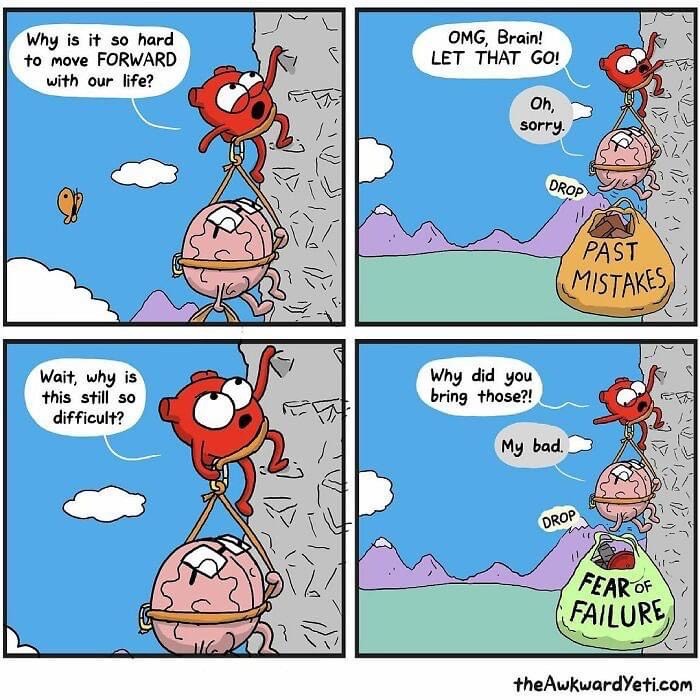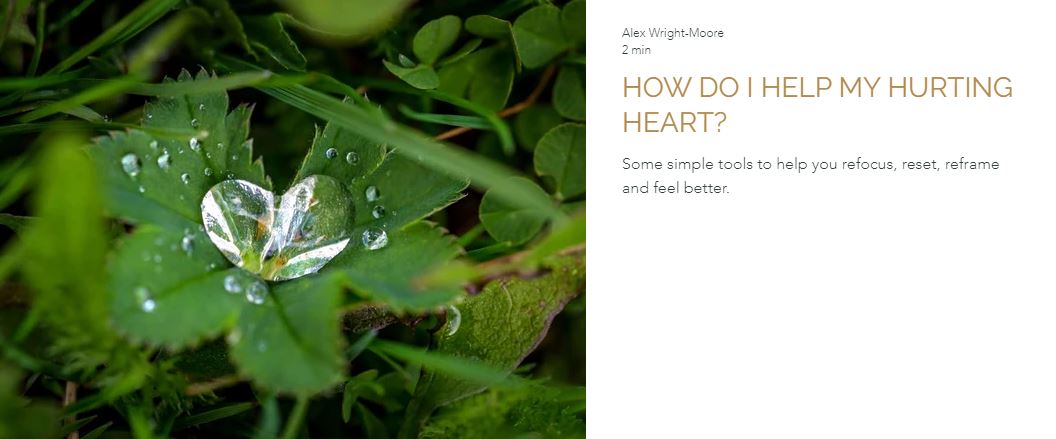Ask A Results Coach: Picking up the pieces after a difficult divorce

Posted on
Are you recently divorced? You’re not alone—and you should never feel like you are.
Enter Alex Wright-Moore, a Results Coach who has kindly offered to answer HerCanberra reader’s questions—and share her knowledge with the HerCanberra audience.
Each month, Alex will explore some of the ways we can better understand what challenges us and empowers us to find solutions.
“I am in the middle of a messy divorce and feel like I have never been so lost. I have children and know I must stay strong for them, but inside I am falling apart. I don’t have friends or family near and the idea of starting again terrifies me. Where do I start?”
When life gets messy and we feel lost, it can often seem like we are standing in a pool of quicksand: Stuck, rooted in our uncertainty and sinking deeper into the confusion or pain of the present moment with each passing minute.
It is a feeling some of us know all too well if we have experienced a devastating change in our circumstances… be it the pain of a significant relationship ending, the loss of a loved one, a missed opportunity or the death of a dream.
In these moments, we all find it difficult to see a clear path forward and it can shake our faith that the future holds real happiness. In time, we often come to realise that the messiest and most painful experiences of our lives are our greatest teachers. But when we are weathering the storm this does little to soothe us in the moments when we are battling to stay afloat among the waves and feel close to giving up.
Rest assured, there are always steps we can take to help ourselves move forward whenever we feel this way. These techniques will not necessarily change our circumstances overnight, but each can be instrumental in helping us move towards a life with greater hope in times when we feel lost, anxious and afraid of what the future holds.
We can acknowledge what we are carrying and identify whether it is sustainable to hold onto
On some level, we all know it is not healthy for us to hold onto things which cause us pain and suffering. Nevertheless, as humans we often have a nasty habit of beating ourselves up with memories which provoke feelings of shame, fear, guilt, inadequacy, anxiety, unworthiness or anger.
When this happens, generally we are not consciously trying to make ourselves feel bad. In fact, most commonly this is an unconscious process or habit we fall into as a way of processing the world around us or coping with our experiences, However, when left unchecked, focusing upon these types of thoughts can consume us and negatively impact how we view the world (and ourselves!), proving to be a recipe for personal heartache.
This being the case, the earlier we learn how to recognise the true source of our painful emotions, understand the catalysts for our feelings and become self-aware of our triggers, the less likely our memories are to haunt us in a self-perpetuating cycle of doubt and uncertainty. But how do we learn to recognise when we are carrying things that are too heavy for us to sustain? Or how can we identify when we are perpetuating our own suffering? More importantly, where do we start with letting go of what is not good for us?
Author and teacher Byron Katie, has developed a process of self-inquiry called the ‘The Work’ specifically for this purpose and recommends we start by noticing what upsets us, why this is so and take the time to write it down. Katie then suggests we ask ourselves four simple questions about each belief that causes us pain:
- Is it true?
- Can you absolutely know that it’s true?
- How do you react when you believe that thought?
- Who would you be without the thought?
After answering these questions, we are then encouraged to come up with a “turnaround” sentence which challenges the beliefs which cause us the most suffering. In simple terms, this practice is a form of self-examination which helps us to truly unpack what we are feeling and recognise how our emotions may be directing our thoughts. Detailed instructions for those who would like to try the process can be found here in addition to a helpful worksheet and video guide.
Importantly, Katie’s technique does not demand that we strive for toxic positivity or pretend we are okay when we are not. But it does encourage us to deliberately become more conscious of what we may be carrying within us from the difficult experiences and memories of our past. Doing ‘The Work’ also encourages us to reflect upon areas where we may be ‘feeding our own demons’ or giving energy, focus and attention to unhelpful thoughts. For anyone new to ‘The Work’ a free helpline is available in multiple languages here.
In saying this, it is also important to acknowledge how challenging it can be to ‘let things go’ in circumstances where we feel hurt, wronged or treated unjustly. Recognising our inability to let go of something, why this is so and identifying what parts may or may not be true is an equally critical step of moving forward. We cannot heal it unless we give ourselves permission to feel it, so the following questions may be useful for anyone who finds themselves not ready to let go just yet*:
- Why am I holding onto this emotion? (I.e. What is the underlying driver, what is it feeding me and is it good for me?)
- Is there any benefit to me holding onto this emotion?
- If I continue to carry this emotion, will it have a healthy impact on my life, my health, my relationships, my sense of self and my future?
- Is this emotion sustainable for me to hold onto in the long term?
*When attempting to unpack complex trauma it is always advised to seek out assistance from a counselling or mental health professional for help with asking and answering these questions.
We can reframe our story in times of change
After a generation of research on the brain, scientists have learned that the story going on in our minds, the story we tell ourselves every day about who we are, where we come from and where we’re going, isn’t just part of us – but actually IS us in a fundamental way. So, if we misplace the plot of that story and get side-tracked by a pitfall, a pothole or a big transition, it is natural for us to feel lost.
To help us understand these feelings, Bruce Feiler, New York Times Best Selling author of Life Is in the Transitions: Mastering Change at Any Age, advises there are some vital truths we need to acknowledge in order to reframe our story. Namely: (1) That the linear life is dead; (2) The nonlinear life involves many more life transitions; and (3) Transitions are a skill we can — and must — master.
“We get through most life transitions with relative ease, but 1 in 10 becomes a lifequake — a massive burst of change that leads to a period of upheaval, transition and renewal,” says Feiler. “The average person has three to five of these in their lives, and their average length is five years. Do the math, and that means we spend 25 years — or half of our adult lives — in transition,” he concludes.
In his recent Ted X talk, Feiler also acknowledges that big life transitions have three phases: (1) The long goodbye; (2) The messy middle; and (3) The new beginning. But in good news there are strategies we can implement to help us reclaim meaning, balance and joy in our lives as we reframe our story in times of change. Watch Feiler’s Ted talk below to find out what they are or read more about them here.
We can be gentle with our heart in its time of healing and practice self-compassion
While self-love tends to be a key ingredient when it comes to overcoming obstacles in life, it is the birthplace of self-compassion and healing in times when our heart feels worse for wear. It can also be an effective antidote to the pressure we place upon ourselves when we have competing demands for our attention in times of distress.
Admittedly, having dependents who are reliant upon our care when our world is falling apart, can be both anchoring and testing. But if we do not invest adequate time and energy into putting our own oxygen mask on when we are in crisis, it is impossible for us to help others to do so. This is where the power of self-love has the potential to work wonders if we are gentle with our heart in its time of healing.
Psychiatrist and Professor of Indigenous Research, Dr. Hinemoa Elder, also speaks of the power of self-love in her recent work Aroha: Māori Wisdom for a contented life lived in harmony with our planet. Dr. Elder shares 52 whakataukī – traditional Māori life lessons – quoting her esteemed mentor, Whaea Moe Milne. “Ka tū tonu koe i roto i te aroha,” says Milne. Translated into English, the lesson means to “Stand in the love. Be true to the love within you.”
In Māori culture ‘Aroha’ is an ancient word and way of thinking that means love, compassion, respect and empathy. On the subject, Dr. Elder writes, “Aroha is a divine feeling. It is strong and never-ending. It comes up out of the ground. We feel it in the warmth of our marae, and with our ancestors, in the places they walked, swam and loved. This ancient love is tangible. We breathe it. We activate and reinvigorate it.”
Applying this lesson one day at a time means practising gentle acceptance of where we are at and giving ourselves permission to take all the time we need to heal our hearts before we move forward. It also testifies to the healing power of nature in times of struggle. For anyone looking for ideas of where to start, you can find additional resources here.
We can invest in our support networks and foster connections to give us a deeper sense of purpose and belonging
Finally, it is important that we never feel we must navigate our major life transitions by ourselves in isolation. Simply sharing our experience with others—a friend, a loved one, a colleague or a stranger can vitally foster a deeper sense of connection to our purpose and belonging.
When it comes to our mental health and wellbeing, studies show that having a good support network with strong relationships we can count on, is essential. Our support networks also offer pillars of support during both happy and difficult times, helping us to feel socially connected and an enduring sense of belonging and purpose.
When we invest in developing a diverse support network, we bolster our resilience by providing multiple anchors for ourselves in times of need. For anyone struggling, Here to Help offers a useful social support wellness module inclusive of a health pulse check survey which helps to determine how much support we have in our lives, with strategies on how to fill any gaps.
Starting again is one of the hardest and most worthwhile endeavours we can undertake in this life, but doing it alone sets us up for failure. Reach out and make those connections which will become part of your story. It is never too late to get started and the rewards are likely to last a lifetime.
The content in this article represents the individual ideas of the writer alone and outlines general advice only. It does not replace individual, independent or personal advice, mental health treatment and/or crisis support.
Coaching does not prevent, cure, or treat any mental health disorder and does not substitute for therapy from a licensed professional if necessary.
Should you require emergency crisis support, please contact Lifeline on 13 11 14 or see your GP to discuss a mental health care plan which can help you access the support you need.
Want to ask your own question?
Neither Alex Wright-Moore, nor HerCanberra receive any kickbacks, commissions, gifts or fees for mentioning anything contained within.



